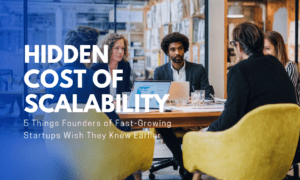Reporter: We’ll be exploring startup co-founder chemistry today with two IT guests. First is Alex Gurkin, an entrepreneur well-versed in web medicine, EHR customization and leading SaaS companies. Eager to accelerate his telehealth app, Alex seeks a co-founder. Also joining us is James Berg, a recent Applied Computer Science grad who co-created a campus delivery app during university. With specialties in UI/UX and backend programming, James has posted co-founder profiles, hoping to partner with a strategist. It will be enlightening to gain the perspectives of Alex’s seasoned expertise and James’s youthful exuberance on blending co-founder skillsets.
Reporter: Alex, let’s start with you. You’ve spoken at conferences, judged UI/UX projects, and written books on co-founder dynamics. With your experience, what drives people to join startups as co-founders?
Alex Gurkin: The main driver, I believe, is the shared vision of creating something impactful. In my journey, whether speaking at conferences or leading as CEO, the aim was always to foster innovation and growth. I’ve seen that the best co-founders are those who share this ethos but also bring a unique skill set to the table.
Reporter: Interesting perspective. And James, fresh out of university with several awards and hands-on experience in software development, what’s your take on this?
James Berg: Well, I think passion and the eagerness to innovate are key. It’s about taking those ideas you scribbled down in class or developed during a hackathon and turning them into reality.
Reporter: Alex, in your books, you’ve emphasized the importance of finding the right co-founder. How can someone identify the right co-founder in their first meeting?
Alex Gurkin: Sure, you need someone capable on paper – but peel back their problem-solving process, resilience, emotional intelligence. Do they counterbalance gaps in your skillset or just echo it? The yin to your yang unveils itself in those unscripted moments when real character emerges.
Reporter: And how do you balance this with personal compatibility?
Alex Gurkin: Personal compatibility is crucial, but it shouldn’t overshadow professional competence. I’ve learned, sometimes the hard way, that familiarity can breed complacency. That’s why, in my experience, including my time at the medical network project, bringing in someone with a fresh perspective can be more beneficial than teaming up with someone you know too well.
Reporter: James, you’ve worked in teams during your studies and at your job. Do you agree with Alex’s view?
James Berg: For sure, in doses. But shared wins build formidable footing too. The magic trio – trust to speak truths, room to disagree, and spades of spice to stir the pot. Old pals who avoid complacency yet feel safe to rock boats stand a fighting chance.
Reporter: Let’s touch on a critical aspect: the role of a CEO. Alex, how should roles be balanced between founders?
Alex Gurkin: The CEO role is often romanticized, but it’s really about who can steer the ship effectively. In my case, I took on the CEO role due to my business experience and my ability to see the bigger picture. However, it’s a decision that should be made collectively, based on strengths and leadership skills, not ego.
Reporter: James, as someone aiming to launch your own startup, how do you see yourself in this dynamic?
James Berg: I believe in a more collaborative approach. While having a CEO is important for decision-making, a startup’s early stage is more about teamwork and leveraging each other’s strengths. I’d prefer a structure where roles evolve as the startup grows.
Reporter: Alex, from your extensive experience, what are some common mistakes when choosing a co-founder?
Alex Gurkin: One major mistake is rushing the decision. It’s like a marriage; you wouldn’t marry someone you just met. Also, overlooking the importance of complementary skills and getting swayed by personal biases are common pitfalls.
Reporter: And James, as someone on the threshold of starting your own venture, what are your strategies to mitigate conflict?
James Berg: I’m a firm believer in the strength of a shared vision and mutual respect. Conflicts usually pop up when goals aren’t aligned, so it’s really important to make sure everyone’s on the same track. Plus, my recent grad experience has really hammered home how crucial being flexible and adaptable is when you’re working in a team.
Reporter: Moving on, Alex, can you list the top five skills you believe are essential for a co-founder in an IT startup?
Alex Gurkin: Sure. First, technological proficiency, especially in areas relevant to your startup’s focus. Second, business acumen – understanding the market and how to navigate it. Third, leadership skills, to inspire and guide the team. Fourth, problem-solving abilities, essential in the unpredictable startup landscape. And finally, communication skills, to articulate ideas and foster collaboration.
Reporter: Excellent points. James, what stages would you consider critical in searching for and evaluating a potential co-founder?
James Berg: From my perspective, firstly, identifying what skills and qualities are needed to complement your own. Secondly, networking, attending events, and engaging in communities where potential co-founders may be found. Third, thorough evaluation, including understanding their past projects and work ethic. Finally, discussing and aligning on goals and visions for the startup.
Reporter: Alex, what tools would you recommend to test a candidate’s business and technical competencies?
Alex Gurkin: There are several approaches. Case studies and problem-solving exercises are effective. They reveal not just technical expertise but also how a person thinks and approaches challenges. Also, discussions about past projects can provide deep insights into their experience and skill set.
Reporter: James, after moving from your university days of hands-on software work to kicking off your own business, how do you think your academic and work life has prepped you for picking the right co-founder?”
James Berg: Well, my time in university, especially all those hackathons and snagging a few awards, really showed me how key it is to work well with others and think on your feet. Then, in the working world, I really got to polish my software and UI design skills. All of this has sharpened my sense of what I’m looking for in a co-founder – the skills they should have and the sort of teamwork we’d need to really make things happen.
Reporter: Alex, based on your rich experience, including your current venture, Friday CRM, what advice would you give to someone starting their journey in finding a co-founder?
Alex Gurkin: It’s imperative to network extensively. Attend conferences, even if remotely, as I’ve often done since 2020. Engage in professional communities and consider being part of events like the regional competitions where I served as a jury member. These platforms not only help in finding potential co-founders but also in understanding the evolving market trends.
Reporter: Alex, you’ve seen quite a few startups through to successful exits. How important do you think a co-founder’s background is in making it big?
Alex Gurkin: Oh, it’s absolutely vital. We’re talking more than just skill sets here – it’s about the whole package: their mindset, their experiences. All these elements really shape the journey and outcome of a startup. In my journey, including my role in medical informatics and my successful ventures, I’ve seen that diverse experiences often lead to innovative solutions and a robust approach to challenges.
Reporter: And James, with your fresh ideas and enthusiasm, what are your thoughts on balancing experience with innovation in a co-founder relationship?
James Berg: I believe innovation often comes from fresh perspectives. However, it’s important to balance this with experience. Someone like Alex, who has a vast background and has seen different phases of business growth, can provide stability and strategic direction, which is vital for a startup.
Reporter: Alex, as someone who has implemented over 300 projects, what’s your approach to conflict resolution within a startup team?
Alex Gurkin: If you’re referring to my 300 projects – those were mainly client work. Only 5 involved me as a co-founder, so admittedly my search experience is limited. But through those open co-founder discussions, I’ve gained useful networking contacts and mutual benefits in considering new key team members. While not gigantic, that experience brings insights into aligning goals and building strong startup partnerships.
Reporter: Finally, James, with your keen interest in launching your own IT startup, how do you envision your journey in finding and working with a co-founder?
James Berg: I’m on the lookout for a co-founder who’s not only as excited as I am but also has a sharp business sense, an area I’m still working on. Mutual respect and clear, honest talks are key for me. I’m really keen on combining my tech know-how with someone else’s business savvy to make something truly meaningful.
Reporter: Thank you, Alex and James. If readers are interested in Alex’s free CRM software or James’ TheHuudle project, you can easily find these guys on social media.
Interview conducted by: Juan Garcia, reports on entrepreneurs, emerging tech trends, and the ever-evolving world of startups. Over the past decade, he has profiled hundreds of founders and innovators, decoding how ideas transform into transformative companies.



































